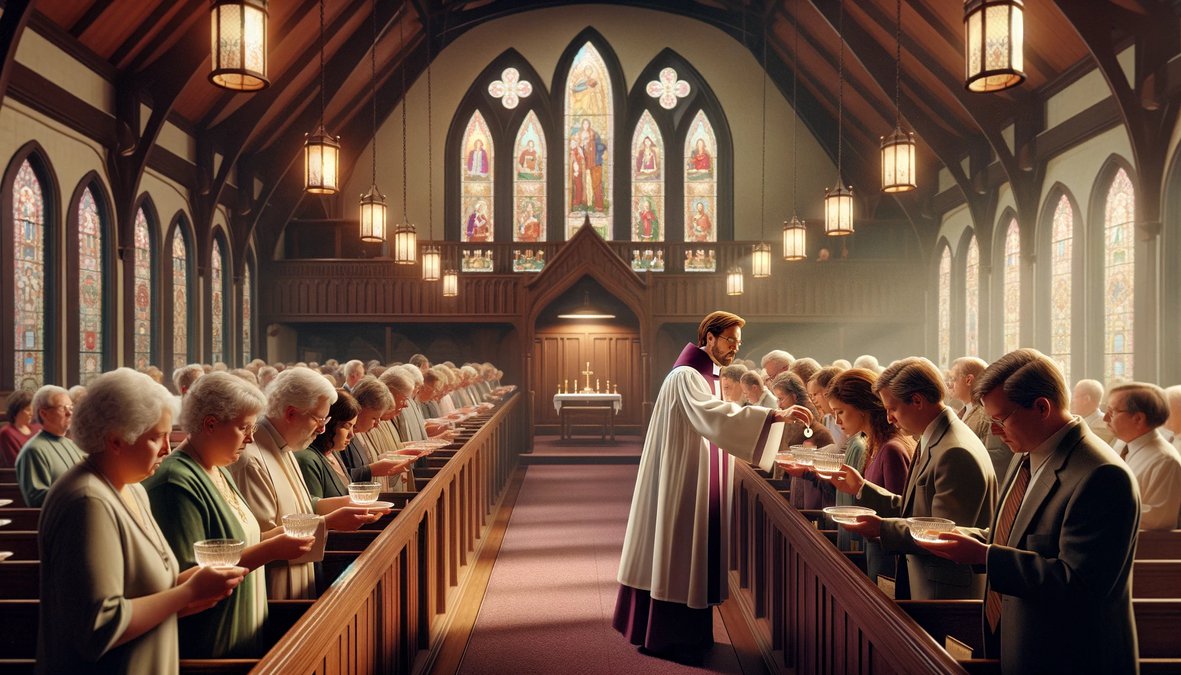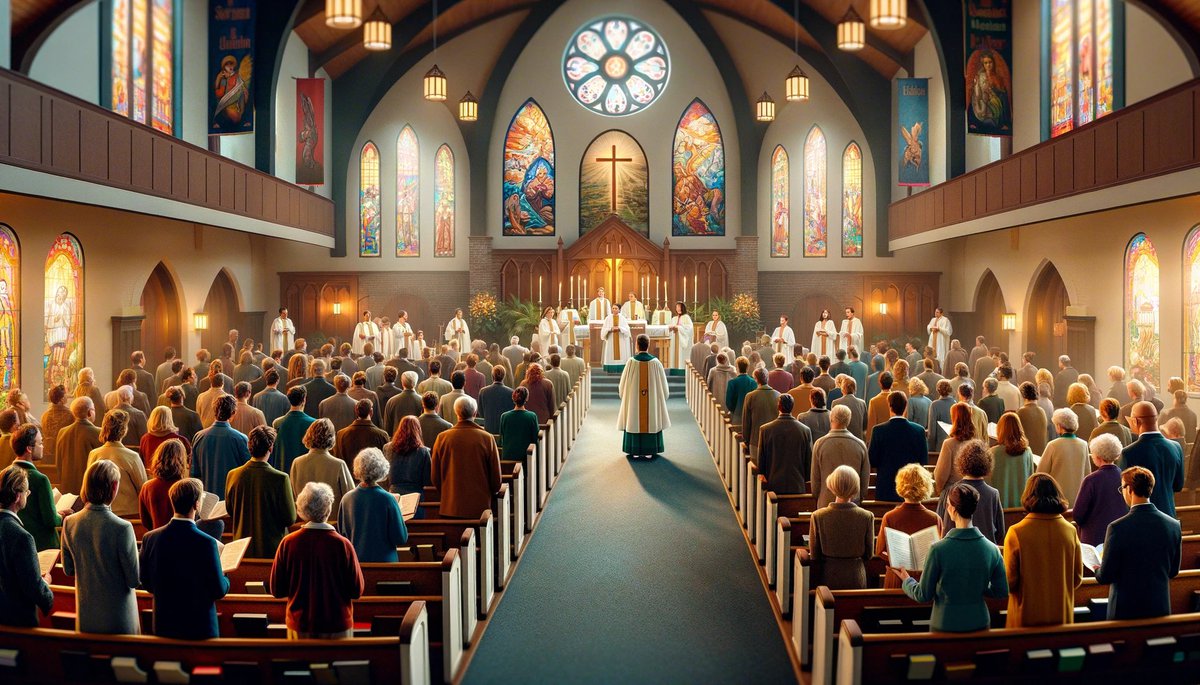Home>Theology and Spirituality>Why Does Church Of Christ Take Communion Every Sunday


Theology and Spirituality
Why Does Church Of Christ Take Communion Every Sunday
Published: February 24, 2024
Ericka Andersen, an editor at Christian.net, expertly merges digital strategy with content creation, focusing on faith and societal issues. Her communication skills enhance the platform's engaging narratives, fostering meaningful dialogue on belief's impact on society.
Discover the significance of weekly communion in the Church of Christ and its theological and spiritual implications. Explore the reasons behind the practice and its importance in the faith community.
(Many of the links in this article redirect to a specific reviewed product. Your purchase of these products through affiliate links helps to generate commission for Christian.net, at no extra cost. Learn more)
Table of Contents
Introduction
The act of taking communion holds profound significance within the Church of Christ, serving as a sacred ritual that symbolizes the spiritual nourishment and unity of believers. This timeless tradition, rooted in the teachings of Jesus Christ, is a central aspect of worship in the Church of Christ. Understanding the reasons behind the weekly observance of communion offers a glimpse into the spiritual depth and communal bond that this practice fosters.
The Church of Christ's commitment to partaking in communion every Sunday reflects a deep reverence for the Last Supper, where Jesus instituted this solemn rite. This act of remembrance not only honors the sacrifice of Christ but also serves as a poignant reminder of the unifying love and grace that permeate the Christian faith. By delving into the historical, spiritual, and communal aspects of this practice, we can gain a richer understanding of why the Church of Christ upholds the tradition of weekly communion.
The significance of communion in the Church of Christ extends beyond a mere ritual; it embodies a profound spiritual connection to the life and teachings of Jesus Christ. Through the act of partaking in the bread and wine, believers symbolically reaffirm their faith, express gratitude for the redemptive sacrifice of Christ, and unite in fellowship with one another. This sacred observance serves as a tangible expression of the spiritual nourishment and communal bond that define the essence of the Christian faith.
As we delve into the biblical foundations, historical practices, and spiritual significance of weekly communion in the Church of Christ, we will uncover the profound depth of meaning and purpose that underpin this timeless tradition. This exploration will illuminate the spiritual and communal dimensions of communion, shedding light on its enduring relevance and transformative impact within the Church of Christ.
Read more: Why Take Communion Every Sunday
The Significance of Communion in the Church of Christ
The act of communion holds profound significance within the Church of Christ, serving as a sacred ritual that symbolizes the spiritual nourishment and unity of believers. This timeless tradition, rooted in the teachings of Jesus Christ, is a central aspect of worship in the Church of Christ. Understanding the reasons behind the weekly observance of communion offers a glimpse into the spiritual depth and communal bond that this practice fosters.
Communion, also known as the Lord's Supper or Eucharist, occupies a central place in the worship and spiritual life of the Church of Christ. It serves as a poignant reminder of the sacrificial death and resurrection of Jesus Christ. The bread and wine, representing the body and blood of Christ, symbolize the profound spiritual nourishment and sustenance that believers receive through their faith in Christ. This act of partaking in communion is a tangible expression of the spiritual union between believers and Christ, as well as the bond that unites them as members of the Christian community.
The significance of communion in the Church of Christ extends beyond a mere ritual; it embodies a profound spiritual connection to the life and teachings of Jesus Christ. Through the act of partaking in the bread and wine, believers symbolically reaffirm their faith, express gratitude for the redemptive sacrifice of Christ, and unite in fellowship with one another. This sacred observance serves as a tangible expression of the spiritual nourishment and communal bond that define the essence of the Christian faith.
Furthermore, communion serves as a powerful symbol of unity within the Church of Christ. As believers come together to partake in this sacred ritual, they are reminded of their shared faith, common purpose, and mutual love for Christ. The act of communion transcends individual differences and unites believers in a shared spiritual experience, reinforcing the sense of community and fellowship that are integral to the Church of Christ.
In essence, the significance of communion in the Church of Christ lies in its ability to encapsulate the core tenets of the Christian faith: love, sacrifice, unity, and spiritual nourishment. This sacred ritual serves as a tangible expression of the profound spiritual connection between believers and Christ, as well as the communal bond that unites them as members of the body of Christ. It is a solemn and transformative practice that continues to shape the spiritual identity and communal life of the Church of Christ, embodying the timeless significance of Christ's sacrifice and the enduring unity of believers.
Biblical Basis for Taking Communion Every Sunday
The biblical foundation for taking communion every Sunday is deeply rooted in the teachings and practices of the early Christian church as recorded in the New Testament. The book of Acts provides insights into the frequency of communion observance among the early believers. Acts 20:7 specifically mentions the disciples coming together on the first day of the week to break bread, which is understood as a reference to partaking in the Lord's Supper or communion. This practice of gathering on the first day of the week, which is Sunday, to partake in communion signifies the significance of this ritual in the early Christian community.
Furthermore, the apostle Paul, in his first letter to the Corinthians, provides a detailed account of the institution of the Lord's Supper by Jesus during the Last Supper. In 1 Corinthians 11:23-26, Paul emphasizes the importance of regularly partaking in communion, stating, "For as often as you eat this bread and drink the cup, you proclaim the Lord's death until he comes." This passage underscores the ongoing and recurring nature of communion as a means of commemorating and proclaiming the redemptive work of Christ until his return.
The early Christians' commitment to gathering for communion on the first day of the week aligns with the significance of Sunday as the day of Christ's resurrection. The resurrection of Jesus on the first day of the week holds profound theological and symbolic significance, signifying the dawn of a new era and the victory of life over death. As a result, Sunday became a day of worship and celebration for early Christians, making it a fitting day for the observance of communion in remembrance of Christ's sacrificial death and triumphant resurrection.
The biblical basis for taking communion every Sunday is firmly established in the New Testament, reflecting the early Christians' practice of gathering on the first day of the week to partake in this sacred ritual. This tradition not only aligns with the teachings of the apostles but also underscores the significance of Sunday as a day of worship and remembrance of Christ's redemptive work. As a result, the Church of Christ continues to uphold the biblical precedent of weekly communion, honoring the timeless significance of Christ's sacrifice and the spiritual nourishment it provides to believers.
Historical Practices of Communion in the Church of Christ
The historical practices of communion in the Church of Christ trace back to the early Christian church and have evolved over centuries, reflecting the enduring significance of this sacred ritual. From the early gatherings of believers in the first-century church to the development of liturgical traditions, the observance of communion has remained a central and unifying aspect of worship within the Church of Christ.
In the early Christian church, the practice of communion was deeply intertwined with the communal gatherings of believers. The book of Acts provides glimpses into the early Christians' observance of the Lord's Supper, emphasizing the communal nature of this sacred ritual. Acts 2:42 describes how the early believers devoted themselves to the apostles' teaching, fellowship, the breaking of bread, and prayer, highlighting the integral role of communion in the shared life of the Christian community. This historical precedent underscores the communal and spiritual significance of communion within the early Church of Christ.
As the Christian church expanded and developed diverse liturgical traditions, the observance of communion evolved to encompass a rich tapestry of practices and customs. The Church of Christ, rooted in the Restoration Movement of the 19th century, sought to restore the primitive and unadulterated practices of the early Christian church, including the observance of communion. This emphasis on restoring the historical practices of communion reflects the Church of Christ's commitment to preserving the authenticity and spiritual significance of this sacred ritual.
The historical practices of communion in the Church of Christ have been characterized by simplicity, reverence, and a deep sense of spiritual solemnity. The focus on the biblical accounts of the Last Supper and the apostolic teachings has shaped the Church of Christ's approach to communion, emphasizing the spiritual and communal dimensions of this sacred observance. The act of partaking in communion every Sunday, in accordance with the biblical precedent, underscores the historical continuity and enduring relevance of this practice within the Church of Christ.
Furthermore, the historical practices of communion in the Church of Christ reflect a commitment to fostering a sense of unity and spiritual nourishment among believers. The act of coming together to partake in the bread and the cup serves as a tangible expression of the shared faith, love for Christ, and mutual fellowship that define the Church of Christ as a community of believers. This historical continuity and communal emphasis underscore the enduring significance of communion in shaping the spiritual identity and communal life of the Church of Christ.
In essence, the historical practices of communion in the Church of Christ embody a rich tapestry of traditions, rooted in the early Christian church and shaped by the Restoration Movement's commitment to preserving the authenticity and spiritual significance of this sacred ritual. The observance of communion every Sunday reflects the historical continuity and enduring relevance of this practice within the Church of Christ, underscoring its profound spiritual and communal significance for believers.
The Spiritual and Community Benefits of Weekly Communion
The practice of weekly communion in the Church of Christ encompasses a myriad of spiritual and community benefits that profoundly enrich the lives of believers and foster a sense of unity within the faith community. At its core, weekly communion serves as a spiritual nourishment, offering believers a tangible and sacred experience of encountering the presence of Christ in their midst. Through the act of partaking in the bread and the cup, believers are reminded of the redemptive sacrifice of Christ and the unifying love that binds them together as members of the body of Christ. This spiritual nourishment revitalizes and strengthens the faith of believers, providing them with a source of sustenance and renewal as they navigate life's challenges and triumphs.
Moreover, weekly communion serves as a powerful catalyst for fostering a deep sense of community and fellowship within the Church of Christ. As believers gather every Sunday to partake in this sacred ritual, they are united in a shared experience of worship, reflection, and mutual support. The act of coming together around the communion table transcends individual differences and fosters a profound sense of unity, love, and mutual care among believers. This communal aspect of weekly communion reinforces the bonds of fellowship and solidarity within the faith community, creating a nurturing and supportive environment where believers can find solace, encouragement, and spiritual companionship.
Additionally, the practice of weekly communion in the Church of Christ cultivates a spirit of humility, gratitude, and self-examination among believers. As they partake in the bread and the cup, believers are prompted to reflect on their relationship with God, their fellow believers, and the broader community. This introspective aspect of communion encourages believers to cultivate a humble and contrite spirit, fostering a deeper awareness of their need for God's grace and the transformative power of Christ's redemptive work. Furthermore, the act of expressing gratitude for the sacrificial love of Christ and the unmerited gift of salvation instills a profound sense of thankfulness and reverence within the hearts of believers, shaping their attitudes and actions in their daily lives.
In essence, the spiritual and community benefits of weekly communion in the Church of Christ extend far beyond a mere religious ritual; they encompass a transformative and enriching experience that nourishes the soul, fosters unity, and cultivates a spirit of humility and gratitude among believers. This sacred observance serves as a wellspring of spiritual nourishment, communal fellowship, and personal reflection, shaping the spiritual identity and communal life of the Church of Christ. Through the practice of weekly communion, believers are continually drawn into a deeper communion with Christ and one another, experiencing the profound and enduring benefits of this sacred tradition.
Conclusion
In conclusion, the practice of taking communion every Sunday holds profound significance within the Church of Christ, embodying a rich tapestry of spiritual, biblical, and communal dimensions. The act of partaking in the bread and the cup serves as a tangible expression of the spiritual nourishment, unity, and communal fellowship that define the essence of the Christian faith. From its biblical foundation to its historical continuity and enduring relevance, weekly communion stands as a timeless and transformative tradition that shapes the spiritual identity and communal life of the Church of Christ.
The significance of communion in the Church of Christ extends beyond a mere ritual; it encapsulates the core tenets of the Christian faith: love, sacrifice, unity, and spiritual nourishment. This sacred observance serves as a poignant reminder of the redemptive sacrifice of Christ and the unifying love that binds believers together as members of the body of Christ. It fosters a deep sense of spiritual nourishment, offering believers a sacred encounter with the presence of Christ and revitalizing their faith.
Furthermore, the practice of weekly communion fosters a profound sense of community and fellowship within the Church of Christ. As believers gather every Sunday to partake in this sacred ritual, they are united in a shared experience of worship, reflection, and mutual support. The act of coming together around the communion table transcends individual differences and fosters a profound sense of unity, love, and mutual care among believers. This communal aspect of weekly communion reinforces the bonds of fellowship and solidarity within the faith community, creating a nurturing and supportive environment where believers can find solace, encouragement, and spiritual companionship.
The spiritual and community benefits of weekly communion encompass a transformative and enriching experience that nourishes the soul, fosters unity, and cultivates a spirit of humility and gratitude among believers. This sacred observance serves as a wellspring of spiritual nourishment, communal fellowship, and personal reflection, shaping the spiritual identity and communal life of the Church of Christ. Through the practice of weekly communion, believers are continually drawn into a deeper communion with Christ and one another, experiencing the profound and enduring benefits of this sacred tradition.
In essence, the tradition of taking communion every Sunday in the Church of Christ stands as a testament to the enduring significance of Christ's sacrifice and the unifying love that binds believers together. It serves as a sacred ritual that nourishes the soul, fosters community, and embodies the timeless essence of the Christian faith. As the Church of Christ continues to uphold this tradition, it remains a poignant and transformative expression of the spiritual and communal dimensions of the Christian journey.














